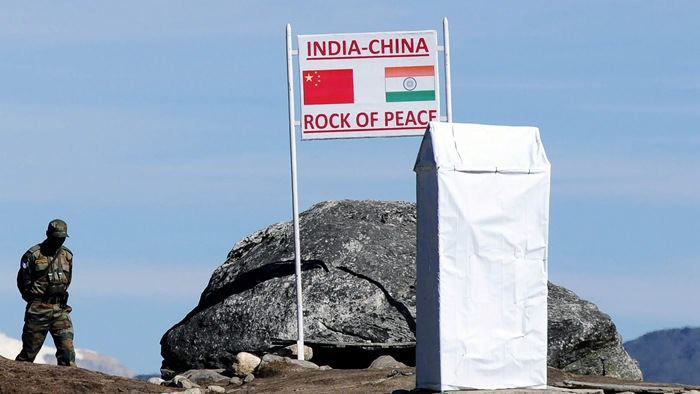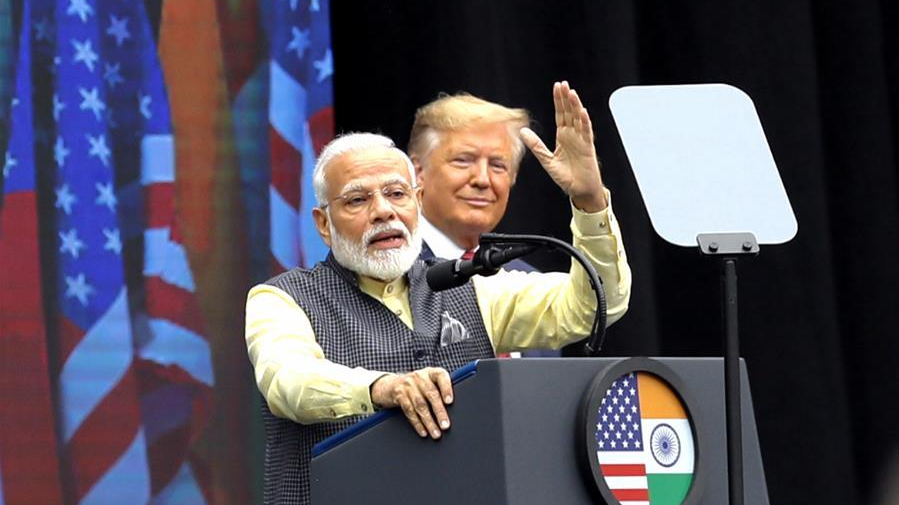
Editor's note: Ken Moak taught economic theory, public policy and globalization at the university level for 33 years. He co-authored a book titled "China's Economic Rise and Its Global Impact" in 2015. The article reflects the author's opinion and not necessarily the views of CGTN.
In the last few months, India appeared to have made a paradigm shift in its China policy. It has escalated the border dispute, banned over a hundred Chinese apps, restricted Chinese investments and imports and played many other antagonistic cards. India is also openly siding with the U.S. on banning Huawei from its 5G network and siding with the U.S. against China in the South China Sea. In short, India appears to be making China an enemy.
The problem, however, is that making China an enemy would make India worse economically and less secure. Chinese goods – electronics, medicine and a host of others – are affordable and necessary for India's sustained economic growth. For example, few, if any, alternative smartphones can replace those made in China. Being a major investor in India's technology startup firms, China's investments positively affect India's innovation ambitions.
On the economic front, India's economy is sinking largely because of COVID-19. As of September 8, almost 4.4 million Indians have been infected, with over 90,000 new cases of infection on September 7 alone – a number greater than China's nine-month cumulative total. COVID-19 cases would likely surge in the coming days and weeks because of the government's determination to re-open the economy to revive the economy that has taken a hit due to the lockdown. Construction, manufacturing and services sectors declined by around 60 percent, 38 percent and 21 percent, respectively, according to the State Bank of India. Given these dismal numbers, it is no surprise that the bank revised the economy's contraction further to almost 11 percent for 2020.
Against this backdrop, it should be obvious that India cannot afford to fight China and address its insurmountable economic and health problems at the same time, thus begging the question: Why is India making China an enemy?

The India-China border. /AFP
The India-China border. /AFP
In addressing the question, many speculative answers emerged, including that an alliance with the U.S. is in India's national interest and deflects attention away from the problems caused by the faltering economy and surging number of COVID-19 infections. But these excuses are a "fool's errand."
First of all, China did not create India's economic problems. It was the British that fermented Indian manufacturing backwardness and inefficiency by forcing its colony to close down the garment industry and buy British clothing during the colonial period. That precluded India from acquiring a pool of skilled labor and slowing its industrialization. And India's chaotic domestic policies – demonetization, the Goods and Services Tax model, lack of structural reform, etc. – are largely responsible for the country's faltering economy.
Take demonetization, the act of taking away a currency unit for transactional purposes, as an example. Prime Minister Narendra Modi ended the use of the 500 rupee (about 7.50 U.S. dollars) and 1,000 rupee notes as a medium of exchange and settlement of debt in order to fight "black money." However, the notes accounted for over 85 percent of the money in circulation, and rendering them useless caused a significant reduction in economic transactions or activities. According to Harvard economics professor Gabriel Chodorow-Reich, the Indian economy shrank by as much as three percentage points.
Second, openly allying with the U.S. and other countries to form an "Asian NATO" against China could risk India's security and further loss of territory. The U.S. and its Asia Pacific allies are fully aware of the folly of war with China, and therefore it is highly unlikely that they will put boots on the ground to help India fight against the Chinese military. What's more, Pakistan might align with China because it has territorial disputes and other quarrels with India. Fighting China alone would be challenging enough, but a two-front war might be devastating for India.

Indian Prime Minister Narendra Modi addresses the "Howdy, Modi!" rally along with U.S. President Donald Trump, Houston, Texas, U.S., September 22, 2019. /Xinhua
Indian Prime Minister Narendra Modi addresses the "Howdy, Modi!" rally along with U.S. President Donald Trump, Houston, Texas, U.S., September 22, 2019. /Xinhua
Third, it should also be pointed that the U.S. ignored India until the South Asian country became useful to America's economic and geopolitical game, a huge potential market for U.S. weapons and an ally to China. Indeed, Trump's "Indo-Pacific" strategy was instituted for that purpose, making India an important player in the "Asian NATO."
However, the marriage of convenience cannot last because they are largely motivated by national interests. In the 1970s, President Richard Nixon's rapprochement with China was primarily to counter the Soviet Union, and Jimmy Carter's establishing diplomatic relations was motivated by the huge Chinese market. However, President Donald Trump saw China's rapid economic, technological and military rise as a "national security threat" that is chipping away at U.S. interests.
India is in a similar situation as China was then. The U.S. wants a large country to buy American weapons and stifle China's rise. But when the U.S. finds that India cannot be controlled anymore, it will likely turn against it.
India might have come to the same conclusion. Indian and Chinese defense ministers met on the sidelines of the Shanghai Cooperation Organization's (SCO) defense meeting in Moscow recently to discuss how the two countries could defuse the border issue. A meeting between India and China's foreign ministers is expected to take place during the course SCO too.
Lowering the temperature on the border dispute issue will be in both nations' national interest.
(If you want to contribute and have specific expertise, please contact us at opinions@cgtn.com.)